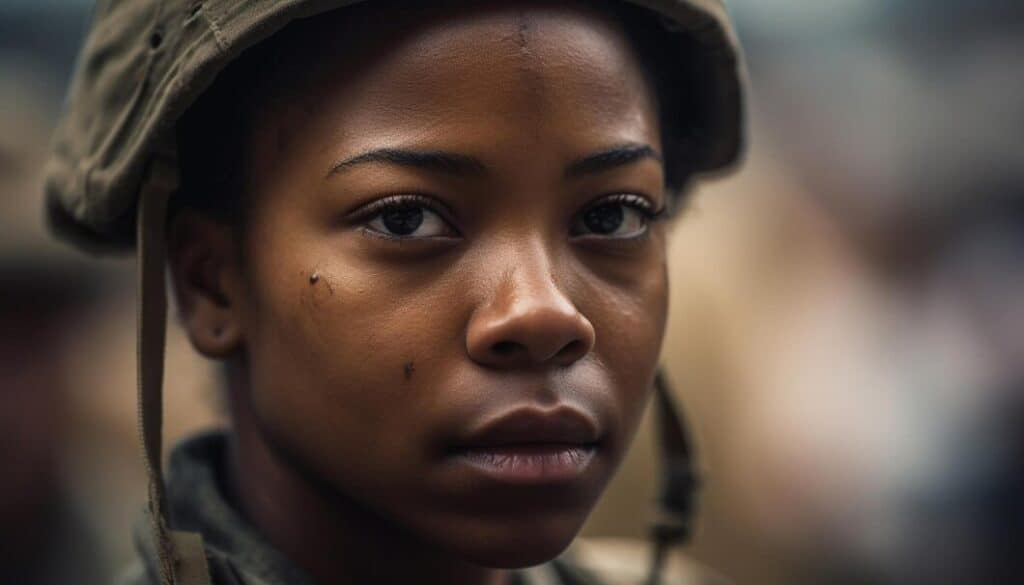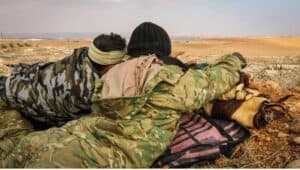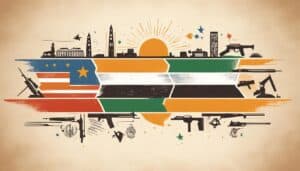
African Conflict and Peacekeeping Efforts | Expert Insights
Nearly 50 delegations took part in a full-day discussion. They focused on how African countries can better tackle global issues.
The talks were part of the celebrations for the African Union’s 60th anniversary and the 20th anniversary of its Peace and Security Council, held every May.1
The global community sees the urgent need for Africa to have a bigger say in world matters.1

The Group of 20 (G20) made a historic move by making the African Union a member in 2023.1
People are also urging for more African presence in the UN Security Council, both in temporary and permanent positions.1
Three African nations serving in temporary roles at the Council support this idea. They say Africa’s growing role on the world stage should be confirmed.1
France, specifically, suggests changing the Council to have 25 members. It would give more space to Africa in the permanent section.1
A big point in the talks was the importance of finding “African solutions for African problems.” People talked about how Africa should have a louder voice in fixing global system issues.1
They also talked about how past European control has caused many problems in Africa. This highlighted the need for Africa to work on making long-lasting peace its own way, based on its own needs.1
With many elections coming up in Africa in 2024, the call for stronger African representation in world leadership is getting louder.1
Key Takeaways
- The African Union’s role in promoting peace and security on the continent is being strengthened, with the UN Security Council expressing readiness to support African-led peace operations.
- There are growing calls for enhanced African representation and reforms in global governance structures, including permanent membership on the UN Security Council.
- The historical legacy of colonialism and the need for “African solutions to African problems” have been emphasized in discussions on conflict resolution and peacebuilding.
- The transition from UN and AU-led missions to more sustainable, African-driven peace efforts will be a critical challenge in the years ahead.
- The inclusion of the African Union in the G20 is a significant step in ensuring that global governance represents the world of today.
The Need for Strengthened African Leadership in Peace and Security
The challenges of conflicts, terrorism, and political unstability in Africa are significant.1
These issues are felt in areas like the Sahel, Congo, and the Horn of Africa, leading to great human suffering.1
The costs to both the people and the development of these places are very high, as the Secretary-General rightly points out.
Challenges Faced by Africans: Conflicts, Terrorism, and Instability
There’s a growing call to boost Africa’s peace power. This means making African leadership stronger in efforts for peace and security locally and worldwide.1
It involves giving African states more say in how global decisions are made.
The Cost of Conflicts: Human Suffering and Developmental Setbacks
The African Union now has more G20 members,1 and many want African nations to join the UN Security Council.
This includes both permanent and non-permanent seats.1 The Peacebuilding Commission is also keen to help, offering to lay foundations for lasting peace.
Unleashing Africa’s “Peace Power” on the Global Stage
In 2024, Africa saw many elections, showing that peaceful transitions are becoming more common.1
However, the challenges remain, and peace is needed in many areas, from the Sahel to Sudan.1
The UN is teaming up with the African Union to fight terrorism together.
UN-AU Partnership: Enabling African-Led Peace Operations
In 2023, the UN Security Council passed Resolution 2719, starting a new peace operations era in Africa.2 This resolution allows the African Union (AU) to get UN funds for peace missions.
The goal is to make these missions better and longer lasting. It also aims to increase African control of peace operations.2
This change comes during a tough time when Africa faces many conflicts. These include issues like militant groups and civil wars in different countries.
UN Security Council Resolution 2719: A New Framework
On December 21, 2023, UNSCR 2719 was passed, focusing on better teamwork between the UN and the AU.
This resolution comes after more than 15 years of talks, showing a growing need for stronger peace efforts in Africa.2 It bridges the gap between what’s needed for peace in Africa and what’s available.
Addressing the Gap in Resources and Capabilities
In 2007, the AU asked for UN help for UNAMID peace mission for the first time.2
It showed the big problems African peace missions face, including not enough money, no big supplies, and few troops. UNSCR 2719 tries to fix these issues.
It allows the UN to help with money for AU-led peace missions. This way, they want to make sure the help is steady and enough.
A good plan is important for this new way to work well. Key things include the country’s okay, political steps, agreement in the region, and everyone’s support.2
Looking at missions like UNAMID and AMISOM can help. They show the UN and AU working together can be really effective.
Criteria for Selecting UN-Assessed Missions in Africa
The African Union (AU) and United Nations (UN) will use specific criteria when choosing peace operations. A major factor is getting the host government’s agreement.2
It’s key for any mission’s success. Also, having clear political and peace agreements is vital for making a decision.2
Host Government Consent and Ownership
Getting the host government to agree is crucial for a peace mission to work.2 This step leads to local support and makes the mission’s goals clearer.
It also boosts the operation’s impact and makes it more likely to last.
Political Processes and Peace Agreements
Having political and peace agreements in place is another important factor.2 These provide a path that the mission can follow.
They link the operation to broader efforts for peace and stability.
Regional Consensus and Support
It’s also vital to have support from neighboring countries for peace missions to do well.2 This support makes the mission more effective and helps with working across borders.
It also makes the mission more legit in the region.
Popular Support and Public Perception
The support and thoughts of local people matter a lot too.2 Making sure they see the mission in a good light helps it work better.
It makes the local community more likely to welcome the operation.
These rules are a good starting point for picking peace operations. However, the real situations where peacekeepers go can change a lot.2
This leads to tough choices and the need to be smart and creative. The AU and UN must think carefully about the conditions of each conflict and adapt their plans as needed.
African conflict and peacekeeping efforts: Lessons from the Past
Lessons from past peace operations are crucial, especially from missions in Darfur and Somalia.
They teach us about the African peacekeeping experiences3. One big lesson is that working together is not always easy.
There were problems with how the AU and UN talked and worked together in Darfur. This caused issues. Now, after learning from this, the African Union leads its own missions with better control.
The UNAMID Experience: Challenges of Hybrid Missions
The UNAMID mission had its share of problems. It was a joint effort between the AU and UN. However, they often struggled to communicate and decide on who does what.
This led to delays and less effective work.4 To fix this, a new plan was put in place.
It gives the African Union more authority over its missions, aiming for better results.
Enhancing Comparative Advantages: AU-UN Collaboration
It’s also key to make the most of what the AU and UN are good at. The UN is great with providing the tools needed and support.
On the other hand, the AU knows Africa best and has strong ties there.3 Finding the right mix of their strengths is vital.
This mix will help make African missions more successful when using UN funds.
Learning from the past is steering us toward better peacekeeping methods. Efforts are ongoing to make the AU and UN partnership stronger.
This makes future missions more effective and lasting. Aiming for a better and safe Africa.
| Key Lessons from Past African Peacekeeping Efforts | Implications for Future AU-led Missions |
|---|---|
| Challenges of hybrid missions, such as the UNAMID experience, where the AU and UN share command and control Communication breakdowns and lack of clear delineation of responsibilities between the AU and UN Need to enhance the comparative advantages of both the UN and AU in peacekeeping operations | Resolution 2719 grants AU-led missions greater autonomy and ownership under the “direct … and effective command and control of the African Union” Leveraging UN’s logistical support and enabling capabilities while capitalizing on AU’s regional expertise and African ownership Striking the right balance between the AU and UN’s strengths for more effective and sustainable peacekeeping operations |
The Future of African Peacekeeping
The future of peacekeeping in Africa is changing. Countries like the Democratic Republic of the Congo and Mali want UN peacekeepers to leave.5
Also, the African Union is pulling its peacekeepers out of Somalia. This is happening because Western governments aren’t funding the mission anymore.3
This shift shows the rising desire for African solutions to peace and security challenges.
Calls for UN Withdrawal from DRC and Mali
The Congolese government asked for a peace force from East African nations to step in in eastern DRC. This shows a move away from depending solely on the UN.5
The “big four” UN missions still have over 60,000 troops.
The UN Security Council agreed that future peace operations led by the AU would get UN support as needed.6
Transition from AMISOM in Somalia
In Somalia, the African Union is pulling out its peacekeepers. This is because Western funding for AMISOM has decreased.3
This change highlights the difficulty in sustaining African-led peace efforts without steady support from the global community.
The path forward in African peacekeeping involves new and strong partnerships. These partnerships should focus on solving the security issues in Africa.6
The planned Pact for the Future, discussed at the UN Summit of the Future, aims to boost global cooperation on peacekeeping challenges and threats.6
Representation and Reforms in Global Governance
Efforts to give Africa more say in global decisions are on the rise. This includes changing how global rules are made. African nations want a say in decisions made by the UN Security Council.
They say their growing role in world matters means they deserve a bigger part.1 Adding the African Union’s g20 membership is a big step in the right direction.
It makes sure today’s world is better reflected at the top level.1 Including Africa more in big global talks is crucial. It helps tackle security issues and push forward with the continent’s plans for growth.
Calls for Permanent African Representation in the UN Security Council
Nearly 50 groups joined talks on changing the UN Security Council and how Africa is represented.1 African nations believe they should have a permanent spot at the UN Security Council.
They note their increased role in the world. This move is about wanting a bigger say in decisions dealing with world peace and safety.
Inclusion in Global Platforms: African Union’s G20 Membership
The African Union became part of the G20 in 2023,1 a decision applauded for making global talks more relevant.
It offers Africa a louder voice in key world discussions on economy and politics. This is how the African nations’ inputs and goals can influence what’s done globally.

Conclusion: African Conflict and Peacekeeping Efforts | Expert Insights
Africa faces big problems with conflicts, terrorism, and instability. But, the continent is getting more determined to lead in solving these issues.7
The passing of UN Security Council Resolution 2719 shows a major change. It lets African-led peace operations get financial support from the UN. This is a big step forward for finding African solutions to African problems.
But, making this work well needs a good plan and learning from the past.7 Also, there’s a need to make global governing bodies fairer.
They should listen to Africa’s concerns and reflect its needs.8 By using its power for peace and putting more effort into being part of global decisions, Africa hopes for a better future.
The UN and AU working together, thanks to UN Security Council Resolution 2719, can make African peace operations better.75
But, making progress in solving conflicts and peacekeeping in Africa faces many difficulties. This includes the threats from conflicts, terrorism, and general chaos.
It also involves making sure that global governance systems include Africa’s rising importance.8
By boosting Africa’s capability for peace and making its voice louder in global decisions, Africa aims for a brighter tomorrow. This would be a drumbeat led by Africa, guided by its own people and choices.758
Related read: African-health-issues-and-healthcare-systems-an-overview
Source Links
- https://press.un.org/en/2024/sc15706.doc.htm
- https://africacenter.org/spotlight/african-union-united-nations-peace-operations/
- https://www.cfr.org/backgrounder/role-peacekeeping-africa
- https://www.un.org/en/global-issues/africa
- https://www.crisisgroup.org/global-mali/what-future-un-peacekeeping-africa-after-mali-shutters-its-mission
- https://issafrica.org/impact/spotlight-securing-the-future-of-african-peace-operations
- https://www.brookings.edu/events/the-future-of-peacekeeping-in-africa/
- https://press.un.org/en/2023/sc15249.doc.htm







